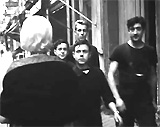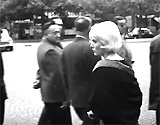
|
Cleo From 5 to 7 (1962, Fr.) (aka
Cléo de 5 à 7)
In writer/director Agnes Varda's dramatic comedy (with
some musical elements), her second feature film, it was about female
identity, told as a meandering episodic character study about the
impending doom facing a shallow, self-absorbed woman who feared the
results of a medical examination, and was able to experience self-discovery;
the Nouvelle Vague film
was shot in real-time and marked with 13 precise chapter headings
(timings from 5 to 7 pm) - supposedly two hours, although the film's
actual length was 90 minutes, and should have been titled Cleo
From 5 to 6:30:
- the opening title sequence (the only sequence in
color) began with the phrase:
"Cut
the deck, please"; the command was issued during a reading
composed solely of close-ups of hands and tarot cards; the session,
delivered by fortune teller Madame Irma (Loye Payen) to blonde
pop singer Florence 'Cléo' Victoire (Corinne Marchand), ominously
revealed Cleo's doomed fate - the Hangman's card of Death ("It
means a complete transformation of your whole being")

|

|
|
Florence 'Cléo' Victoire (Corinne
Marchand)
|
- the central heroine was Florence 'Cléo' Victoire
- a pretty but
superficial, superstitious, distressed hypochondriac who was forced
to wait two hours until the early evening for the results of diagnostic
hospital tests regarding terminal stomach cancer
- many times in the film, Cleo vainly and self-reflectively
viewed herself in a mirror, at one time reassuring herself - in
voice-over - that her beauty meant that she was very much alive: "Wait,
pretty butterfly. Ugliness is a kind of death. As long as I'm beautiful,
I'm even more alive than the others"
- the vain Cleo met with
or was surrounded by various individuals during her wait, beginning
at 5 pm with the fortune teller (from the title sequence), then
a café visit
at Bonne
Santé (Good
Health) with her loyal secretary/housekeeper Angèle (Dominique
Davray) when she broke down after viewing her face through a fractured
mirror - a symbol of her frazzled psyche: ("I might as well
be dead already"),
followed by shopping for a bonnet; after shopping, the two took a
taxi back to her luxurious Paris studio apartment where she had a
brief visit from her superficial lover-boyfriend José (José Luis
de Villalonga)
- during Cleo's music rehearsal
with her pianist-composer Bob (Michel Legrand) and lyricist
Plumitif (Serge Korber) in her apartment,
the two joked around (by pretending to be doctors); she sang
the torch song Sans
Toi with great emotion - the song began with her using sheet
music while accompanied on the piano by Bob, then shifted her perspective
to a full-scale orchestral performance, as she sang with tears
and the background turned black behind her, signifying her feelings
of blackness, emptiness and death
- afterwards, believing that her music producers weren't
being emotionally supportive, she angrily dismissed her composer
and lyricist, telling them that they weren't taking her seriously
as an artist: "What's
a song? How long can it last? You make me capricious! Nothing but
a china doll! Revolutions with macabre words. You think I'll make
a hit with that? You're trying to exploit me! Get out!? No, I'm getting
out...It's over";
when called a "spoiled, self-pitying child," she responded: "Everyone
spoils me, no one loves me"; Cleo donned a black
dress, ripped off her wig, put on a black hat, and told her maid:
"I want to be alone," and left her apartment
- on the street near the Good Health Health Food store
as she wandered about the streets of Paris, she looked into a store
mirror with foreign writing and
expressed her frustrations: "My
unchanging doll's face, this ridiculous hat. I can't see my own
fears. I always think everyone's looking at me, but I only look
at myself. It wears me out"; to remain anonymous, she put
on sunglasses and entered a cafe to order a brandy as she listened
to other conversations; growing impatient, she soon entered
back onto the exterior sidewalk, and from
her own subjective and anxious POV, she thought that everyone was
judging her and gazing at her
|
Cleo's Friend Dorothee - A Nude Model
|

|

|

|
|
"My body makes me happy, not proud"
|
- she entered an artist's
sculpture studio, where she visited with friend
Dorothée
(Dorothée
Blank), a liberated and uninhibited model who was posing nude for
a group of sculptors; Dorothee reacted to Cleo's fear of posing
nude: ("I'd feel so exposed, afraid they'd find a fault") by endorsing
her artistic profession: "My body makes me happy, not proud. They're
looking at more than just me. A shape, an idea. It's as if I wasn't
there. Like I was asleep. And I'm paid for it"
- Dorothee's boyfriend
Raoul (Raymond Cauchetier) projected a short silent comedy
("a
film within a film") to cheer Cleo up; as she left the movie
house, she dropped her purse on the pavement and broke her small
mirror, causing her reflection to reveal her detached fragmentation
and distortion; she believed it was a bad omen
|
Ending Sequence: Cleo's Chance Meeting With a
Soldier on Leave
|

|

|
- by the end of the film, Cleo had changed from her
polka-dot dress and discarded her fluffy wig, and was wearing
only a plain black dress; the ending sequence began in the calm
setting of the 14th arrondissement's Parc de Montsouris - she had
a chance meeting with Antoine (Antoine Bourseiller), an on-leave
soldier from the Algerian War who formed an understanding of trust
with Cleo; she honestly revealed that her real name was Florence
although she was called Cleo: ("I'm
called Cléo, short for Cleopatra"); Antoine responded: "What
a name! Florence. It conjures up thoughts of Italy, the Renaissance,
Botticelli, a rose. Cleopatra! Egypt, the Sphinx, the asp, a tigress.
I prefer Florence"
- with kindness, Antoine observed
her as a whole, unobjectified, and unspoiled person and she was
transformed and empowered; he comfortingly agreed to accompany
her to get her test results if she would later see him off at the train station
- test results were that Cleo required two months
of chemotherapy; as they parted, the two spoke the final two lines
of dialogue: Antoine: "I'm sorry I'm leaving. I'd like to
be with you." Cleo: "You are. I think my fear is gone.
I think I'm happy"; she realized that her selfish problems or
issues in life were minor compared to many others, and found peace
for herself
|

Hangman's Tarot Card of Death

Cleo in Cafe: "I might as well be dead already"

Cleo's Break-down in Cafe

In Her Parisian Studio Apartment, With Her Suave Boyfriend Jose


Cleo's Music Rehearsal With Her Composer and Lyricist
in Her Apartment

Cleo Donned a Black Dress and Ripped Off Her Wig Before Leaving Her Apartment

"I only look at myself. It wears me out"



The Many Mirrors and Crowds Surrounding Cleo - From Her
POV - As She Wandered Around Paris
|












